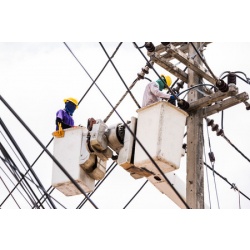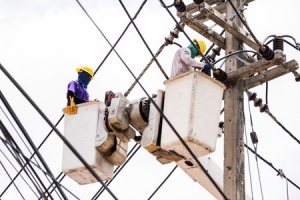
Letter to the Editor: Utility Vote Offers A Clear-Cut Choice
(The following Letter to the Editor has been submitted by Dick Janson of Decorah):
"Voters will have a clear choice in the May referendum as to who they wish to provide their electricity – a municipal utility owned by the community OR an investor-owned utility owned by outsiders. Although both can distribute electrical power, the critical differences are stark and plain for everyone to see, in spite of the many scare tactics and misleading statements coming from Alliant and its supporters.
First – the Yes/No vote in opening Alliant's books to public scrutiny. Was Alliant's feasibility study legitimate or was it "smoke and mirrors" designed to create doubt, confusion, and fear? A "Yes" vote gives the city the option to file an application to the Iowa Utilities Board, thereby forcing Alliant to open its books. A "No" vote keeps Alliant's lid of secrecy in place, which is what they want. It should be pointed out that if Alliant really believed some of their claims to be true – that municipal rates will be 30 percent higher, that it will cost the city $50 million to purchase the infrastructure, that a municipal will provide reliable service – they wouldn't be spending so much money by increasing staff in Decorah and conducting a widespread media blitz to create that doubt, confusion, and fear.
Second – both types of utilities charge electric rates to generate revenue to cover both operating and capital expenses. But here is where the similarity ends. Covering the costs of operations and capital expenses, which includes paying a full time staff of community employees to manage and maintain the utility, is all a municipal utility must do, just like the City of Decorah now does with sewer and water. However, an investor-owned utility is first and foremost committed to generate profits on top of capital expenses, in order to generate dividends to their investors, and pay exorbitant high salaries to their management team. It is worth noting that Alliant's CEO received more than $5 million in total compensation in 2017. That's money that comes from your monthly utility bill. Our own municipal utility is not required to raise that profit nor pay those kinds of salaries. Rather, the money generated by our own municipality is money that doesn't go out of state, but instead can be used to pay our own utility staff, including lineman, very competitive wages and benefits. Voters thus have a clear choice as to whether they wish to pay higher rates so Alliant for investor dividends and high-priced CEOs, or use that revenue to improve our own community and employ our own people.
Third – the Yes/No vote determines who voters want a utility to be responsible to and held accountable by. A municipal utility's major responsibility will be to provide lower electrical rates and high customer service to its owners who are also their customers. An investor-owned utility's major responsibility is to its investors, the vast majority of whom do not live in Decorah, or for that matter, even in Iowa. If Alliant keeps its rates sufficiently high in order to provide extra money in order to pay dividends to its shareholders, it can keep its investors happy. Remember, Alliant was just granted another 7.8 percent rate increase, and they are far and away the highest price utility in Iowa.
Thus voters have in their hands a clear-cut choice. After that, the differences are unmistakable and plain to see. A municipal utility can get the job done and do it reliably and affordably as do more than 2,000 municipals do for 49 million customers all across America. A municipal utility will be more focused on our needs as a community. A community-owned municipal utility will be more accountable to our community's elected representatives. A municipal utility will be more responsive to the directions in which our community wishes to move. And, lest we forget, a municipal utility will be focused on keeping rates low and customer service high since its customers are also its owners."
Site designed and maintained by Iroc Web Design Services©.
Your Small Business Web Design Solutions.™


